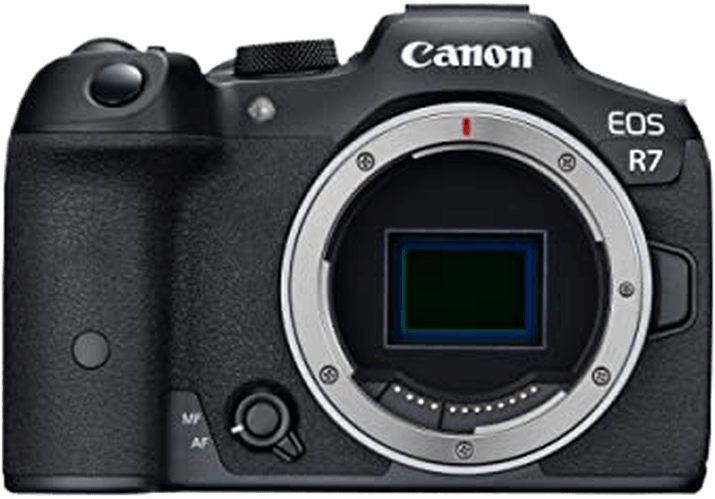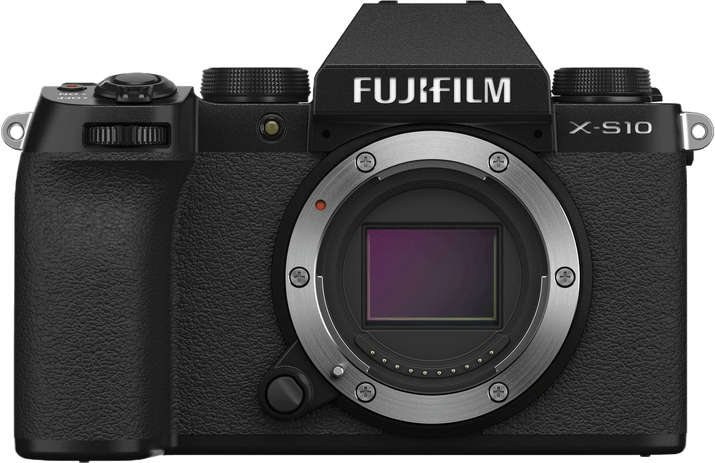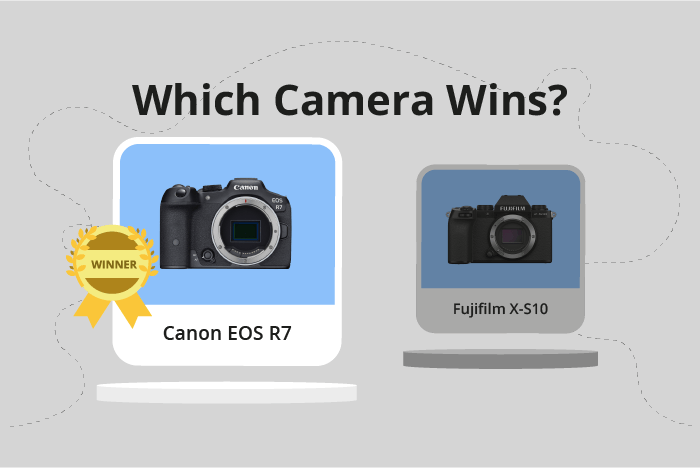Canon EOS R7 vs Fujifilm X-S10 Comparison
Canon EOS R7

Fujifilm X-S10

The Canon EOS R7 edges out the Fujifilm X-S10 with a score of 83/100 compared to 69/100. Both cameras are mirrorless and were released in 2022 and 2020, respectively. They share similarities in specs, such as camera type and dimensions, with the EOS R7 measuring 132 x 90 x 92mm and the X-S10 at 126 x 85 x 65mm.
The EOS R7 is superior due to its higher score, reflecting better overall performance. However, the Fujifilm X-S10 has its advantages, such as a lower launch price of $999 compared to the EOS R7’s $1500, and a lighter weight of 465g versus 612g.
Weighing the pros and cons, the Canon EOS R7 stands as the winner with its improved features, while the Fujifilm X-S10 remains a more affordable and lighter option.
Canon EOS R7 vs Fujifilm X-S10 Overview and Optics
The Canon EOS R7 outperforms the Fujifilm X-S10 in optics with a score of 82/100 compared to the X-S10’s 72/100. Both cameras share some common specifications, including an APS-C sensor, CMOS sensor type, and in-body image stabilisation.
The EOS R7 excels with its 33-megapixel resolution, which is higher than the X-S10’s 26 megapixels. This difference allows the R7 to produce more detailed images. The R7 also benefits from a more advanced processor, the Digic X, which contributes to better overall image quality. Furthermore, the Canon EOS R7 has a DXOMARK sensor score of 97, providing a reliable benchmark for image quality. The lens mount on the R7 is Canon RF, which offers access to a wide range of high-quality lenses.
On the other hand, the Fujifilm X-S10 has a faster shooting speed of 20 frames per second, compared to the R7’s 15 frames per second. This advantage makes the X-S10 more suitable for capturing fast-moving subjects. The X-S10’s lens mount is Fujifilm X, which also provides a variety of lens options, although it may not be as extensive as the Canon RF system.
Considering the higher score and superior specifications, the Canon EOS R7 is the better choice for those prioritising image quality and resolution. The Fujifilm X-S10, with its faster shooting speed, may appeal to photographers focusing on action and sports photography. However, the overall optics performance of the Canon EOS R7 proves to be the stronger contender in this comparison.
Canon EOS R7 vs Fujifilm X-S10 Video Performance
The Canon EOS R7 and Fujifilm X-S10 both receive a video score of 91/100, indicating their comparable video capabilities. They share several key specifications, including 4K max video resolution and built-in time-lapse functionality. However, there are differences between the two cameras that may sway a user’s preference.
The Fujifilm X-S10 exceeds the Canon EOS R7 in terms of max video dimensions and max video frame rate. The X-S10 offers 4096 x 2160 video dimensions, compared to the R7’s 3840 x 2160. Additionally, the X-S10 provides a higher max video frame rate of 240fps, doubling the R7’s 120fps. These specifications make the X-S10 better suited for capturing fast-paced action and producing more detailed video content.
On the other hand, the Canon EOS R7 does not outperform the Fujifilm X-S10 in any specific video-related category, since they share the same video score and most specifications. However, it is important to consider other factors, such as lens selection, ergonomics, and overall system compatibility, which may impact a user’s choice between these two cameras.
When comparing the video capabilities of the Canon EOS R7 and Fujifilm X-S10, it is evident that the X-S10 has an edge in terms of max video dimensions and frame rate. Despite their equal video scores, the X-S10 offers more flexibility and potential for high-quality video capture. The R7 remains a strong competitor, but users seeking the best video performance may prefer the Fujifilm X-S10.
Canon EOS R7 vs Fujifilm X-S10 Features and Benefits
The Canon EOS R7 emerges as the winner with a feature score of 85/100, while the Fujifilm X-S10 trails behind at 70/100. Both cameras share several specifications, including a 3-inch screen size, touchscreen capabilities, flip screens, and the absence of GPS. Additionally, both cameras offer Bluetooth connectivity.
The Canon EOS R7 outperforms the Fujifilm X-S10 in a few key areas. Firstly, the EOS R7 boasts a screen resolution of 1,620,000 dots, compared to the X-S10’s 1,040,000 dots. This higher resolution provides clearer and sharper image previews on the camera’s screen. Moreover, the EOS R7 features Wi-Fi connectivity, which the X-S10 lacks. Wi-Fi enables easy and quick sharing of photos and videos, as well as remote control of the camera through a smartphone.
On the other hand, the Fujifilm X-S10 does not hold any significant advantages over the Canon EOS R7. Both cameras share many features, and the X-S10 falls short in terms of screen resolution and Wi-Fi capabilities.
Taking these factors into account, the Canon EOS R7 proves to be the superior camera in terms of features. Its higher screen resolution and Wi-Fi connectivity make it a more versatile and user-friendly option compared to the Fujifilm X-S10. Conversely, the X-S10 does not offer any unique advantages that would make it a more appealing choice. Therefore, potential buyers should consider the Canon EOS R7 for its better performance and additional capabilities.
Canon EOS R7 vs Fujifilm X-S10 Storage and Battery
The Canon EOS R7 outperforms the Fujifilm X-S10 in storage and battery, scoring 79/100 compared to the X-S10’s 35/100. Both cameras accept SD, SDHC, and SDXC memory cards and have USB charging capabilities. However, the EOS R7 surpasses the X-S10 in several aspects.
The EOS R7 has two memory card slots, allowing for more storage and backup options, whereas the X-S10 has only one slot. Additionally, the EOS R7 is compatible with faster UHS-II cards, while the X-S10 only supports UHS-I cards. The EOS R7 also boasts a longer battery life, providing 660 shots per charge compared to the X-S10’s 325 shots. The EOS R7 uses the LP-E6NH battery, whereas the X-S10 relies on the NP-126S battery.
The Fujifilm X-S10 does not excel in any specific area concerning storage and battery when compared to the EOS R7. Therefore, the Canon EOS R7 is the clear winner in this category, offering more storage options, faster memory card compatibility, and longer battery life.
Canon EOS R7 vs Fujifilm X-S10 – Our Verdict
Are you still undecided about which camera is right for you? Have a look at these popular comparisons that feature the Canon EOS R7 or the Fujifilm X-S10:

